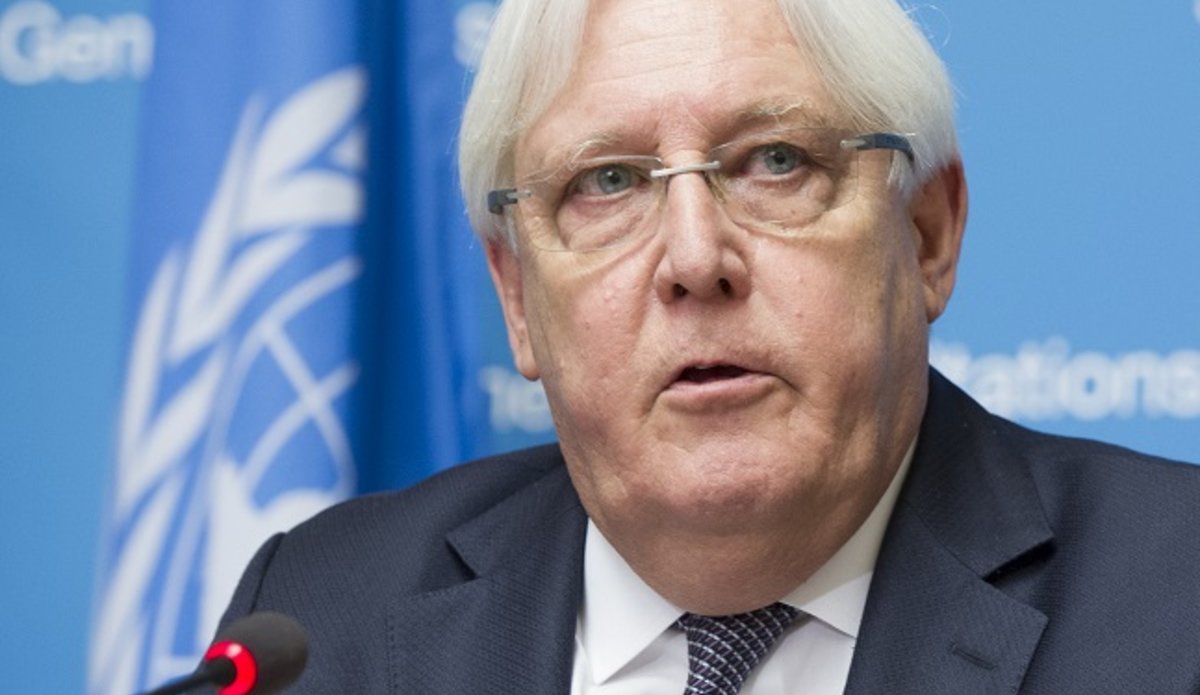UN Special Envoy for Yemen, Martin Griffiths briefs the press in Geneva
Good afternoon. Thank you all very much for being here on this beautiful day and your interest indeed in the situation in Yemen.
I know that you have all been following from here particularly closely the humanitarian issues of course in the country and know the situation in that respect probably better than I do, and know well the devastating toll that the conflict continues to take on the lives of so many thousands of Yemenis.
I just want to briefly refer to some elements of the peace process and then perhaps some of the issues that may make peace more difficult.
In this regard, there are three points that I think we need to keep in mind:
First of all, despite the fact that the Stockholm Agreement agreed in December the 13th of 2018, is taking quite some time for implementation, I think it is interesting that both parties continue to insist that they want a political solution. The military solution is not available. They remain committed to the Stockholm Agreement and all its different aspects and they see it, and this is a vital point, they see it as the gateway to opening up negotiations on a political solution. So I think, quite remarkable and unexpected in some ways that we are still observing commitment from both sides to make what they agreed in Stockholm happen, despite all the difficulties.
The second point, in specific terms about Hodeida, is obviously the centerpiece of that agreement made in Sweden. We have all experienced many frustrations, but what happened last week, I think, was quite striking, that after quite a lot of difficulty, my colleague General Michael Lollesgaard, the Head of the UN Mission for the Hodeida agreement, convened the two parties on the UN vessel, the Artic åDream, which took place on the high seas of the Red Sea. So he brought them together for two or three days to meet, the fact that they had to meet on a boat in the middle of the Red Sea gives an indication of course, of some of the logistical and security difficulties of convening the parties. But they did come, they sat there, they discussed together some crucial issues and made more progress than I would have imagined. They came to specific agreements on the operational plans for all the redeployments that they had agreed to do in Sweden so many months ago. They did not come to an agreement on two or three issues, which remain for me to resolve with the parties; first being the approach to local security forces which has been a vexed issue for some time, the second being the issue revenue in the port, and the third being related to the first, which is governance. Since that meeting, even yesterday, my colleagues have been meeting with both parties to put forward proposals. We believe that the issue of revenue is not that difficult to resolve. We believe it’s the issue of local security forces, which is going to cause most need for tension.
Thirdly, of course the decision by the Coalition to redeploy forces out of Yemen. I think, as I said last week at the Security Council, this does do exactly what one of those senior officials talked about, to put as they put it “peace first”. There has been a long article by Dr. Anwar Gargash, from the Arab Emirates, I think in the Washington Post, outlining where he sees the impact of that. The impact is, could be of high strategic significance. The reason those redeployments happened, and this was not unexpected to us, was in order to make a push towards a commitment towards peace, and a very deliberate one from one of the two coalition partners. We need to take advantage of it, and I am very happy to talk about that in more detail. So these are sort of the issues that face us on the peace process. As with anything else, and you know this much better than me, and I have used the term in public before, war can take peace off the table at any moment and it is so in Yemen as it is so elsewhere.
I should talk about three things and then I will stop.
This is the fifth year of this war and even in Yemen, the war is becoming more and more complex, more and more fragmented, there are many wars in Yemen, and the longer this goes on, not only is it the longer people will die from hunger and conflict, but the solution becomes more difficult. The fragmentation of Yemen is an alarming trend, an alarming pattern, which is one of the reasons, the principle one have been humanitarian, why, I’ve always urged speed towards finding a political solution.
Secondly, there are, as in war, continuous acts which can detonate significant issues in the war. For example, there are political acts, like the death sentences that we heard from Sana’a, only a week or ten days ago, which I would condemn, as I did also in the Security Council last week. Also, the attacks on civilian infrastructure in Saudi Arabia, it could be very alarming, because here I come to my third point, which is of course the possibility of Yemen getting dragged into a regional conflict, and much of the time that we have been devoting recently is to try to see how we can make sure that doesn’t happen.
Yemen has its own problems, and the prospects of it becoming involved in or part of the possible regional conflict hardly bears examination. One of the things therefore worth spending a lot of time in doing is trying to see how we can stop that through various measures of de-escalation. I only mentioned those three things because they illustrate the difficulties that we face, and here I will end.
I believe that this war in Yemen is eminently resolvable. I believe that the diplomatic consensus, whether in the Council or growing diplomatic consensus in the region towards resolving it politically, is in our favor. I believe that the solution to the war in Yemen is well known to all, has been extensively discussed in previous talks between the parties. All that is needed is for us to be able to have the opportunity, us being the parties, to get on with it and to have those negotiations. That is why the Stockholm Agreement is essential. We have to get it implemented if we are going to pass through that door and get on with the political process.
Thank you very much.
 UN
UN







